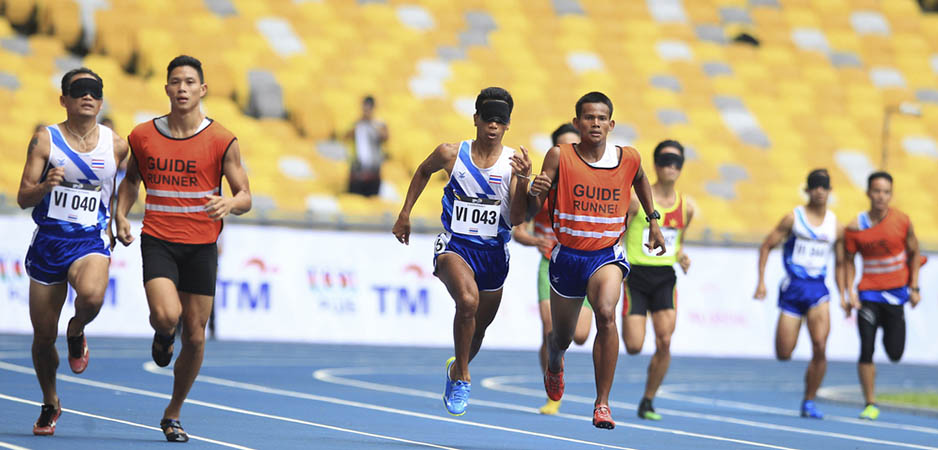The Asian Para Games can bring change to Indonesia so it can be more friendly to people with disabilities.
The 2018 Asian Para Games is currently taking place in Jakarta. The multi-sport event is held every four years for athletes with physical disabilities. A total of 2,762 athletes with special needs from 43 countries compete in 18 different sports.
During the opening ceremony of the games, which runs until October 13, Indonesian President Joko Widodo said, “Through the 2018 Asian Para Games, we want to celebrate brotherhood.”
Indeed, the event is not only a stage for those who struggle to go beyond their limits. Rather, it is also a moment to celebrate the equality and fulfillment of the rights of persons with disabilities. The Asian Para Games should be seen as a campaign wrapped in sports to show that people with disabilities — if they are given the opportunity — are also able to achieve, succeed and independently exceed the limitations that exist in themselves.
As the host, success for Indonesia is not merely measured by the success of the the event itself. Rather, Indonesia is targeting the top eight with 18 gold medals. This is higher than what it managed in the 2010 and 2014 games. But even more important is that the success leaves a legacy of a disabled-friendly Indonesia. The wish is that this nation can be more friendly toward fellow human beings with special needs, no longer seeing them as second-class citizens, even after the event ends.
Indonesians with disabilities are still marginalized in all aspects of life. The “equality” mentioned in public about the disabled is not only sweet to say, but also needs to be fought for endlessly so it actually materializes.
Realizing equal rights and opportunities for people with disabilities is regulated by law. This piece of legislation calls for everyone to live a prosperous, independent and non-discriminatory life. Under the law, persons with disabilities have the right — just like anyone else — to education, employment and public services. Yet when put into practice, the conditions remain far from what people expect.
Life for Persons with Disabilities
Those living with disabilities struggle with the right to employment. Even though the law requires every company to accommodate workers with disabilities — whereby at least 1% of positions should reserved for the disabled — this is not the case. There are still many companies that refuse disabled applicants. There are also those who accept people with disabilities, but they only do so to meet the company quota and instead pay them a lower salary. Facilities in workplaces that are not disabled-friendly are also a serious problem. Even in 2018, there are still many office buildings in Indonesia that are unfriendly for persons with disabilities.
The same goes with education. The so-called special-needs schools are often not run with appropriate curriculums that can cater to different types of students with disabilities. For example, those students who have physical disabilities are still taught color identification and counting one to 10, despite being able to learn at the same pace as their peers.
Although the government has imposed obligations on public schools to accept disabled students, not all institutions are ready. They either lack the physical facilities or the teachers have little or no experience in dealing with special-needs students.
 Other changes are needed in terms of social attitudes toward those who are disabled. There are still many who look down on persons with disabilities. This is a major factor as to why people with disabilities in Indonesia do not have equal rights.
Other changes are needed in terms of social attitudes toward those who are disabled. There are still many who look down on persons with disabilities. This is a major factor as to why people with disabilities in Indonesia do not have equal rights.
The Asian Para Games is the first step to promote a disability-friendly atmosphere in all corners of the country. Stories of people who struggle beyond their limitations at the event should be a reminder to us that persons with disabilities are human beings who have the opportunity to exceed expectations and to change their country. If the right opportunities are available in all aspects of life, not just sports, disabilities would never be a barrier for them to achieve spectacular things beyond their non-disabled peers.
The hope is that the 2018 Asian Para Games can bring change to Indonesia so it can be more friendly to those with disabilities. After all, they too are Indonesians who have great potential, just like their fellow citizens.
The views expressed in this article are the author’s own and do not necessarily reflect Fair Observer’s editorial policy.
Support Fair Observer
We rely on your support for our independence, diversity and quality.
For more than 10 years, Fair Observer has been free, fair and independent. No billionaire owns us, no advertisers control us. We are a reader-supported nonprofit. Unlike many other publications, we keep our content free for readers regardless of where they live or whether they can afford to pay. We have no paywalls and no ads.
In the post-truth era of fake news, echo chambers and filter bubbles, we publish a plurality of perspectives from around the world. Anyone can publish with us, but everyone goes through a rigorous editorial process. So, you get fact-checked, well-reasoned content instead of noise.
We publish 2,500+ voices from 90+ countries. We also conduct education and training programs
on subjects ranging from digital media and journalism to writing and critical thinking. This
doesn’t come cheap. Servers, editors, trainers and web developers cost
money.
Please consider supporting us on a regular basis as a recurring donor or a
sustaining member.
Will you support FO’s journalism?
We rely on your support for our independence, diversity and quality.






